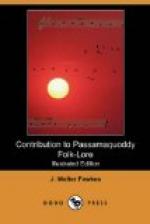The folk stories of the Passamaquoddies are but little known to the young boys and girls of the tribe. It is mostly from the old and middle-aged persons that these stories can be obtained. I was told by one of these story-tellers that it was customary, when he was a boy, for the squaws to reward them for collecting wood or other duties with stories. A circle gathered about the fire after work, and listened for hours to these ancient stories, fragments no doubt of an ancient mythology, upon which possibly had been grafted new incidents derived by the Indians from their intercourse with the various Europeans with whom they had been brought in contact.
WAR SONGS.
I succeeded in getting upon the phonograph several war songs, typical of a large number known to the Passamaquoddies. The words of many are improvised, though there is no doubt that the tunes are ancient. The words of one of these songs are given below.
I will arise with tomahawk in my hand, and I must have revenge on that nation which has slain my poor people. I arise with war club in my hand, and follow the bloody track of that nation which killed my people. I will sacrifice my own life and the lives of my warriors. I arise with war club in my hand, and follow the track of my enemy. When I overtake him I will take his scalp and string it on a long pole, and I will stick it in the ground, and my warriors will dance around it for many days; then I will sing my song for the victory over my enemy.
“M’ toulin.”
Passamaquoddy Indians are believers in a power by which a song, sung in one place, can be heard in another many miles away. This power is thought to be due to m’ toulin, or magic, which plays an important part in their belief. Several instances were told me, and others have published similar observations. Leland, in his “Algonquin Legends of New England,” pp. 517, 518, gives a weird account of an Indian who was so affected by m’ toulin that he left his home and travelled north to find a cold place. Although lightly clad and bare-footed, he complained that it was too hot for him, and hastened away to find a climate more congenial to his tastes. In this account one is led to believe that the man was insane, and that to the Indian insanity is simply the result of m’ toulin.
THE ORIGIN OF THE THUNDER-BIRD.
In a very interesting paper of A.F. Chamberlain, on “The Thunder-Bird among the Algonquins,” in the “American Anthropologist,” January, 1890, reference is made to the belief in this being among the Passamaquoddy Indians. On my recent visit to Calais I obtained from Peter Selmore a story of the origin of the Thunder-Bird, which is different from any mentioned by Leland. This story, I regret to say, I was unable to get on the phonograph.




